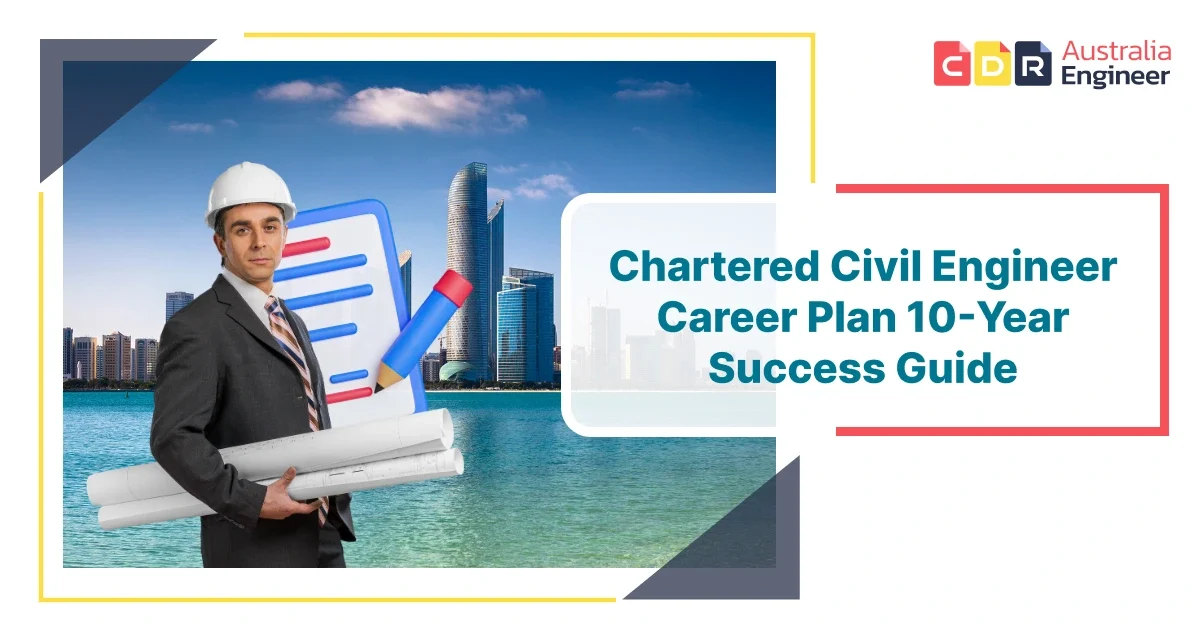

💥🥂 NEW YEAR GRAND DISCOUNT — Save up to 35% on Our Services. Offer Ends at 1st week of Jan
If you’re a civil engineer aspiring for a stable and respectable career in Australia that pays well, you need to have a successful path to Chartered Civil Engineer. Rather than flitting from role to role, the plan will get you there stepwise by developing a sound foundation, acquiring the right experience, and ultimately becoming a chartered engineer with Engineers Australia.
In this blog, we’ll discuss the civil engineering scope in Australia, the salary you can expect, the skills needed, and how professional services such as CDR Services, RPL Service Australia, VETASSESS Services, and Resume Writing Services all fit into your Chartered Civil Engineer Career Plan.

Every strong chartered civil engineer career plan starts with the right foundation. Without this base, it becomes difficult to grow into chartered level later. Your basic foundation should include:
If you gained your qualification overseas, your Chartered Civil Engineer Career Plan may also include:
At this stage, do not worry too much about job titles. Focus on learning how projects are designed, approved, and constructed. The more you understand how your drawings and calculations work on site, the stronger your chartered civil engineer career plan becomes.
To differentiate yourself as a future chartered civil engineer, you will need more than the theory alone. Your Chartered Civil Engineer Career Plan should encompass the ongoing development of both technical and soft skills.
Skill Type | Key Skills & Tools | Why It Matters |
Technical skills | Structural design, geotechnical basics, transportation, water, construction methods, CAD/BIM tools, understanding Australian Standards | Forms the core of your engineering competence and supports your CDR and project responsibilities. |
Soft skills | Clear communication, report writing, teamwork, stakeholder coordination, problem-solving | Helps you deal with clients, contractors, and councils and show professional maturity. |
Project & leadership skills | Time management, basic project management (scope, cost, risk), site coordination, mentoring juniors | Proves you can take responsibility, lead small teams, and handle real project risks. |
Professional development | CPD courses, workshops, site visits, seminars, industry memberships | Keeps your knowledge current and is essential evidence for Engineers Australia and chartered status. |
Career documents | Strong resume, clear Career Episodes, Summary Statement, CPD records | With support from CDR Services and Resume Writing Services, you present your skills professionally. |
Many engineers seek chartered status as it provides a better salary and is more likely to provide job security long term. Paying price varies by region and company, but in general, the trajectory is clear: Rather than just randomly changing jobs:
CDRaustraliaengineer specialises in high-quality CDR pathway reports for engineers. We offer low-cost, customised, and reliable services tailored to meet Engineers Australia’s standards.

CDRAustraliaEngineer offers software engineers specialized ACS RPL services that include 100% original content, customized EA/ACS skill assessment reports, and high success rates. Get in touch with us now!
There is a broad, long-term future for civil engineers in Australia. Infrastructure, buildings, transport networks, water systems, renewable projects, and much more require skilled engineers. With a smart chartered civil engineer career development plan, you could move into the following roles:
All engineers are valued, but when chartered status is attached, it has even greater value to your name. Chartered status means a chartered civil engineer reaches a higher professional standard in competence, ethics, and responsibility than a non-chartered engineer.
To clarify, a progressive 10-year career plan for chartered civil engineers may be divided into several stages.
At this point, you might begin work on your CDR or other projects. Professional CDR services such as career episode writing and summary statement writing represent efficiency gains and may assist you in clearly articulating your experience.
At each transition stage, reflect: “Am I taking this step for my Chartered Civil Engineer Career Plan?“ That simple question keeps your development focused.
If you are an overseas civil engineer planning to move to Australia, the CDR (Competency Demonstration Report), RPL Service Australia, and VETASSESS Services may all be part of your Chartered Civil Engineer Career Plan.
Doing all of this by yourself is distressing and incredibly time-consuming. With cdraustraliaengineer, you can pick just the service you need CDR, RPL, VETASSESS, or resume writing services and have clear advice each step of the way.
Reading about a chartered civil engineer career plan is your starter. The real progress is when you:
Remember, CDRAustraliaEngineer is here to help you with clear pricing and support tailored to your requirements. You can transition from civil engineer to chartered civil engineer with more confidence and less stress when you stay engaged with your plan and use some of the available supports.
Q. What does a chartered civil engineer career plan look like?
A chartered civil engineer career plan outlines how you will advance from a junior civil engineer to the chartered level in Australia as a career map
Q. Why do I need a chartered civil engineer career plan?
It keeps your jobs, skills, CDR, and Continuing Professional Development (CPD) aligned so you actually move toward chartered status and a better salary, not just random experience.
Q. What skills should I address first?
Begin with strong technical design skills, effective communication, and project management fundamentals, then phase in leadership as your responsibilities grow.
Q. How can CDR, RPL, and VETASSESS services help me?
They will assist you in showcasing your skills and experience from overseas, making your Chartered Civil Engineer Career Plan both achievable and realistic.
Q. When should I start a chartered civil engineer career plan?
You should ideally start planning while you are in your final study year or first position, but you can undertake developing a Chartered Civil Engineer Career Plan at any stage in your career.